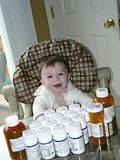YEA!! I've been tagged by
Cindy for the
Honest Scrap Award, which means I have to write 10 honest truths about myself or my life! I don't have time right now to do it, since I have been on the computer this whole time Lil' Chris was taking a nap and now he is awake. But I did find some new blogger friends!! I'd like to share Christy's blog with you. I added her to my blog list under
Color Me Healthy. She had a great post about Asthma. It's really interesting! Check it out,
click here! Her post reminded me of a topic that I have been meaning to blog about for a while now.
A few months ago, my Dad told me about a vitamin I could take during my pregnancy to help reduce the chances of my baby having asthma problems. It won't cure CF if she has it, but it can't hurt. It also makes babies smarter too! That's a plus. It's called Omega-3. It has a full spectrum of 7 Omega-3s, DHA, EPA, and more(yes, that was straight from the bottle:). These Omega-3 fish oil capsules have lots of fatty acids, which are good for CFers. Back in the old days, Omega-3 used to be in a lot of the food we eat, but today it has been replaced by Omega-6 which is no good. Omega-3 can be found in fish, flax seed, and a few other things if you don't want to take the pill. The only fish I eat is fish sticks and that doesn't really help, so I take 3 Omega-3s a day.
He also told me that it is good for Lil' Chris too b/c of his CF. So, I have been breaking one of the capsules and have been pouring it on a spoonful of food for him once a day. I pour it on kinda like I do with his enzymes, but it is a liquid type. He doesn't seem to mind it. I was shocked, b/c it smells like fish when it is broken open. I know...gross right? Anything to keep my kids as healthy as possible though.
Anyway, my Dad has read that it may have beneficial anti inflammatory effects for people with chronic diseases such as CF. There was a study done in Italy that showed a drop in need of antibiotic medication. There was another study showing that it helps or prevents ADD or ADHD too.
When Lil' Chris was first diagnosed, my husband was researching on the Internet and found studies that Omega-3 was good for CFers. So the next time we went to our CF Clinic, he asked our CF doctor about it and the doctor said "There has been no studies on it or any proof." We were confused, b/c there
have been studies on it, but I guess we just kind of dismissed it since he didn't think that it would do anything. Now, we are thinking "but what if it
is good for him?" It can't hurt to give it to him just in case it
does do some good and maybe it
will improve his future! Has anyone else ever done any studies on Omega-3?
Here is one study:
Cystic fibrosis and fish oils
GENT, BELGIUM. There is evidence that cystic fibrosis patients with high plasma phospholipid levels of omega-3 fatty acids have better lung function than patients with lower levels. Cystic fibrosis (CF) is, unfortunately, often accompanied by fat malabsorption so it is not clear whether oral fat supplementation with omega-3 fatty acids would benefit CF patients.
Researchers at the State University of Gent set up an experiment to see if CF patients are able to absorb omega-3s effectively by mouth. The trial involved 9 CF patients (4 females and 5 males) ranging in age from 7 to 20 years. All had been diagnosed with pancreatic insufficiency and had poor fat absorption despite supplementing with pancreatic enzyme preparations. The patients were assigned to receive either 6 fish oil capsules per day for a month followed by 6 placebo capsules for a month or 6 placebo capsules daily for a month followed by 6 fish oil capsules daily for a month. Each fish oil capsule contained 335 mg of salmon oil and 165 mg of commercial soy lecithin and provided 152 mg of omega-3 fatty acids. The placebo capsules contained 500 mg of pharmaceutical-grade liquid paraffin.
The researchers found that the CF patients who took fish oil showed a marked increase in their phospholipid levels of eicosapentaenoic acid [EPA] (increase of 327%) and docosahexaenoic acid [DHA] (increase of 215%). The levels of EPA and DHA returned to baseline 2 weeks after discontinuing supplementation. The researchers also noted that patients with low initial levels of EPA showed the greatest increase in EPA levels after supplementation. They conclude that oral supplementation with fish oil and lecithin is effective in increasing the levels of omega-3 fatty acids especially EPA and DHA in cystic fibrosis patients.
Christophe, Armand, et al. Increase of long chain omega-3 fatty acids in the major serum lipid classes of patients with cystic fibrosis. Ann Nutr Metab, Vol. 36, 1992, pp. 304-12 Here is another study relating it to helping with Asthma:
Asthma
Diet rich in fish may help prevent childhood asthma
SYDNEY, AUSTRALIA. Childhood asthma is now a major health problem in Australia with 31% of West Australian children having been diagnosed with the condition. Chronic inflammation of the airways is also a major problem with 12% of the population reporting wheeze severe enough to disturb sleep. Studies involving Australian school children have shown that those who consume oily fish more than once a week have a significantly reduced risk of asthma.
Australian researchers now suggest that the epidemic of childhood asthma is associated with a change in the omega-6 to omega-3 fatty acid ratio in the Australian diet. It used to be around 5:1, but is now 15:1 or higher. They recently concluded a study of 355 school children of which 166 had been diagnosed with asthma at 6 years of age and the remaining 169 acted as asthma-free controls. A comparison of the two groups showed that the significant risk factors for asthma were:
Gestational age less than 37 months (OR=2.93)
Maternal asthma (OR=6.13)
Breastfeeding for less than 6 months (OR=2.25)
A high omega-6/omega-3 ratio in the diet (OR=1.93)
After adjustment for other known risk factors the risk of asthma was 2.89 times higher among children with an average dietary omega-6/omega-3 ratio of 18 than among children with a ratio of 8. The researchers believe that the benefits of a diet high in omega-3 fatty acids are due to the inclusion of more EPA (eicosapentaenoic acid) and DHA (docosahexaenoic acid), the two main components of fish oil.
Oddy, W.H., et al. Ratio of omega-6 to omega-3 fatty acids and childhood asthma. Journal of Asthma, Vol. 41, No. 3, 2005, pp. 319-26If you'd like more info about it, or have any question, just let me know. Here is a good link to check out about the studies they have done on this...
http://www.oilofpisces.com/children.html#fibrosis. I hope this info is useful to you,
M
PS. I've added a picture to the top of this post. They are pudding like packets of Omega-3 that is easier to give to a child. We are going to get them soon and try them on Lil' Chris. I'll let you know how it goes.





































